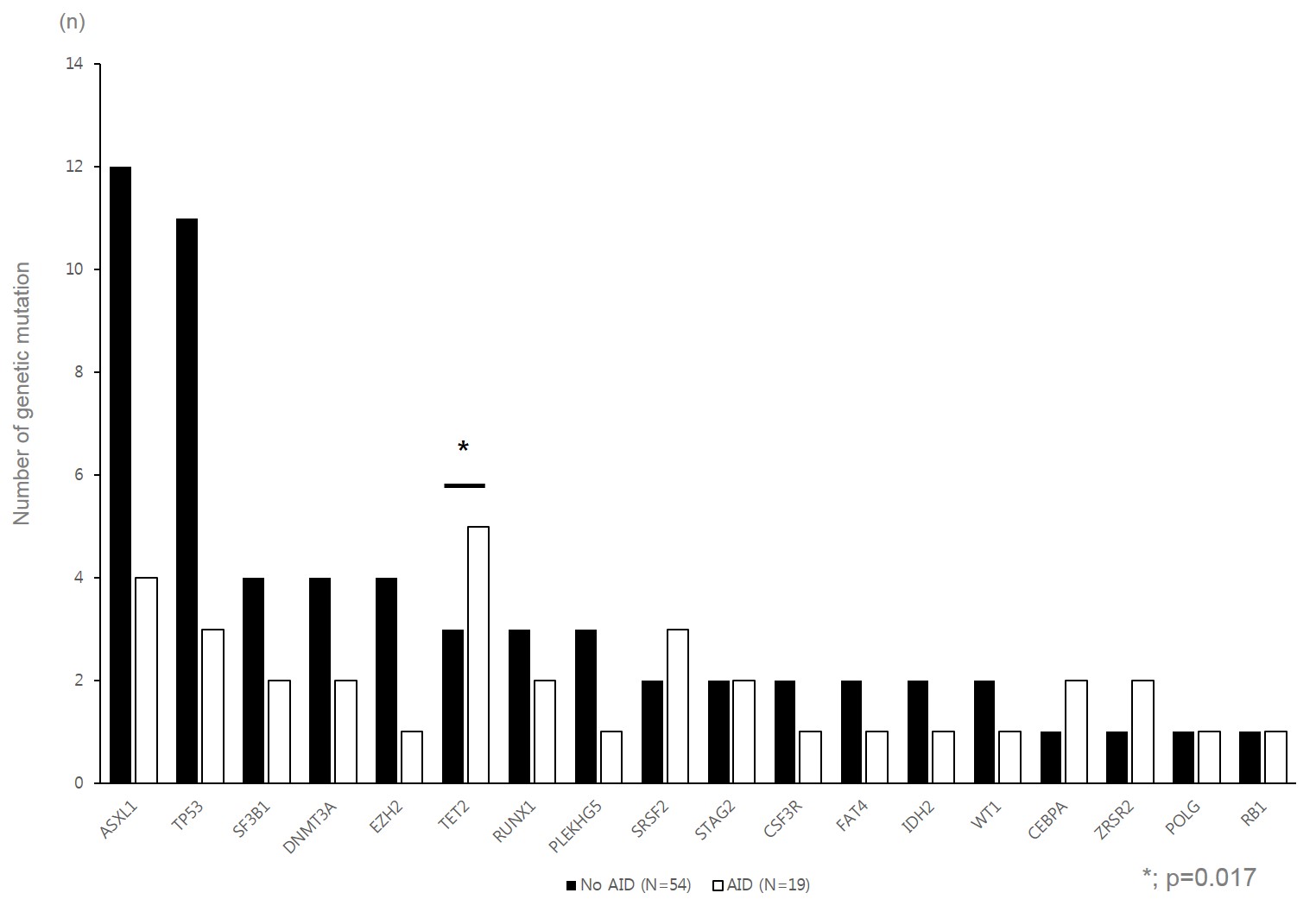Session Information
Session Type: ACR Concurrent Abstract Session
Session Time: 9:00AM-10:30AM
Background/Purpose: Myelodysplastic syndrome (MDS) is characterized by ineffective hematopoiesis in bone marrow and peripheral cytopenia. Various genetic mutations contribute to MDS. Common mutations affect genes regulating epigenetic control, protein translation among others. A recent study demonstrated that certain autoimmune manifestations were associated with specific karyotypic abnormalities in patients with MDS. The aim of this study was to investigate whether particular genetic mutations are associated with the occurrence of autoimmune disorders in MDS.
Methods: A total of 88 genetic mutations that are commonly associated with MDS were sequenced in 73 MDS patients. The association of each mutation with autoimmune disease (AID) was analysed.
Results: The mean age of MDS patients was 65.1 years, and 49 (67.1%) were male. During the follow-up duration, 19 (26.0%) developed AIDs; 7 (9.6%) thyroiditis, 5 (6.8%) immune thrombocytopenia (ITP) and haemolytic anemia (HA), and 1 (1.4%) rheumatoid arthritis (RA), 1 (1.4%) ankylosing spondylitis (AS), 1 (1.4%) systemic lupus erythematosus (SLE), 1 (1.4%) panniculitis, 1 (1.4%) psoriasis, 1 (1.4%) neutrophilic dermatosis, and 1 (1.4%) uveitis. Baseline demographic and laboratory parameters did not differ between patients with AID.
Of 73 MDS patients, 57 (78.1%) carried mutation at least in 1 of the 88 selected genes. The presence of mutation (73.7% vs. 79.6%, p=0.75) and the number of mutations (2.32 vs. 2.04, p=0.56) were similar between the patients with or without AID. Strikingly, the TET2 mutation was significantly higher in patients with AID compared to those without AID (26.3% vs. 5.6%, p=0.017). Five (62.5%) of 8 MDS patients with TET-2 mutation exhibited AID (RA, AS, ITP, panniculitis, and neutrophilic dermatosis).
Conclusion: Mutation of TET2, an epigenetic regulator, might be associated with increased risk of developing autoimmune diseases in patients with MDS.
Table. Baseline characteristics in patients with MDS
|
|
MDS(N=73) |
|
Age at diagnosis, mean (SD) |
65.1 (14.6) |
|
Male (%) Female (%) |
49 (67.1%) 24 (32.9%) |
|
Autoimmune abnormalities Rheumatoid arthritis (%) Ankylosing spondylitis (%) Autoimmune thyroiditis (%) SLE (%) ITP/Hemolytic anemia (%) Panniculitis (%) Psoriasis (%) Neutrophilic dermatosis (%) Uveitis (%) |
1 (1.4%) 1 (1.4%) 7 (9.6%) 1 (1.4%) 5 (6.8%) 1 (1.4%) 1 (1.4%) 1 (1,4%) 1 (1.4%) |
|
MDS, subtypes Refractory anemia, n (%) RCMD, n (%) RAEB-1 and2, n (%) MDS/MPN, n (%) Unclassifiable, n (%) Others, n (%) |
5 (6.8%) 15 (20.5%) 28 (38.4%) 7 (9.6%) 15 (20.5%) 3 (4.1%) |
|
Genetic mutation Yes No |
57 (78.1%) 16 (21.9%) |
Figure. Gene mutations features in MDS with or without autoimmune diseases
To cite this abstract in AMA style:
Oh YJ, Shin DY, Hwang SM, Lee EY, Song YW, Lee DS, Park JK. TET2 Mutation Is Significantly Associated with the Development of Autoimmune Disorder in Patients with Myelodysplastic Syndrome [abstract]. Arthritis Rheumatol. 2017; 69 (suppl 10). https://acrabstracts.org/abstract/tet2-mutation-is-significantly-associated-with-the-development-of-autoimmune-disorder-in-patients-with-myelodysplastic-syndrome/. Accessed .« Back to 2017 ACR/ARHP Annual Meeting
ACR Meeting Abstracts - https://acrabstracts.org/abstract/tet2-mutation-is-significantly-associated-with-the-development-of-autoimmune-disorder-in-patients-with-myelodysplastic-syndrome/

